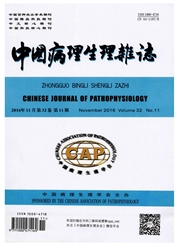

 中文摘要:
中文摘要:
目的:探讨垂体腺苷酸环化酶激活肽Ⅰ型受体(PAC1受体)特异激动剂maxadilan对人脂肪干细胞(adipose-derived stem cells,ASCs)的增殖、凋亡和分化潜能的作用。方法:取人脂肪组织通过酶消化法分离培养ASCs。流式细胞术鉴定ASCs表面标志物,并进行ASCs向成骨成脂定向诱导。CCK-8法和流式细胞术检测maxadilan对ASCs活性的影响。采用波长为254 nm的紫外线(ultraviolet C,UVC)照射ASCs,CCK-8法测定不同剂量的UVC诱导ASCs凋亡后的吸光度。选择剂量为702 J/m2的UVC照射ASCs 24 h后,用流式细胞术和caspase 3和caspase 9试剂盒检测maxadilan对ASCs凋亡的影响。结果:流式细胞术检测表明细胞CD29、CD44、CD59和CD105表面抗原阳性,证实所提取的细胞是ASCs。CCK-8法检测发现80 nmol/L浓度的maxadilan对ASCs促增殖作用最强,流式细胞术分析也证实80 nmol/L maxadilan处理显著促进ASCs的增殖,与对照组比较差异有统计学意义(P〈0.05)。与仅被702 J/m2UVC照射的ASCs比较,80 nmol/L maxadilan显著抑制同等剂量UVC照射ASCs所诱导的、与caspase 3和caspase 9活性相关的细胞凋亡,2组比较差异有统计学意义(P〈0.05)。同时,2组细胞成骨和成脂的诱导分化均为阳性。结论:Maxadilan促进ASCs增殖,抑制ASCs凋亡,且不改变细胞向成骨和成脂诱导分化的潜能。Maxadilan有利于ASCs的体外生长与扩增。
 英文摘要:
英文摘要:
AIM:To investigate the effect of maxadilan, which specifically activates pituitary adenylate cycla-se-activating polypeptide type I receptor (PAC1 receptor), on the proliferation, apoptosis and differentiation potential of human adipose-derived stem cells ( ASCs) .METHODS:ASCs from human adipose tissue were isolated by enzymatic di-gestion and cultured.ASCs were confirmed by the analysis of the markers for cell phenotypes by flow cytometry ( FCM) and adipogenic/osteogenic induction.The effect of maxadilan on ASCs viability was analyzed by CCK-8 assay and FCM.ASCs were irradiated by ultraviolet C ( UVC) at 254 nm and the absorbance of apoptotic ASCs induced by various doses of UVC was measured by CCK-8 assay.ASCs were exposed to 702 J/m2 UVC for 24 h to induce apoptosis.The effect of maxadilan on ASC apoptosis was analyzed by FCM and the determination of caspase 3 and caspase 9 levels.RESULTS:Adipose-de-rived stem cells were confirmed by the detection of the positive expression of cell phenotypes including CD29, CD44, CD59 and CD105 by FCM.The data of CCK-8 assay revealed that ASCs treated with maxadilan (80 nmol/L) had the strongest ability of proliferation.The data of FCM also demonstrated that the addition of 80 nmol/L maxadilan to ASCs in experimen-tal group markedly improved the proliferation capacity of the cells compared with control group (P〈0.05).The apoptosis of ASCs exposed to 702 J/m2UVC was dramatically inhibited by the treatment with maxadilan (80 nmol/L).Such process involved the caspase signaling pathway including caspase 3 and caspase 9.There was statistical significance (P〈0.05) between experiment group ( ASCs irradiated by UVC and supplemented with maxadilan) and control group ( ASCs only irra-diated by UVC) .Meanwhile, adipogenic and osteogenic differentiation potentials were both positive in experiment group and control group.CONCLUSION:Maxadilan promotes proliferation and inhibits apoptosis of the ASCs.The differentia-tion potential of ASCs
 同期刊论文项目
同期刊论文项目
 同项目期刊论文
同项目期刊论文
 期刊信息
期刊信息
